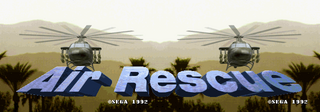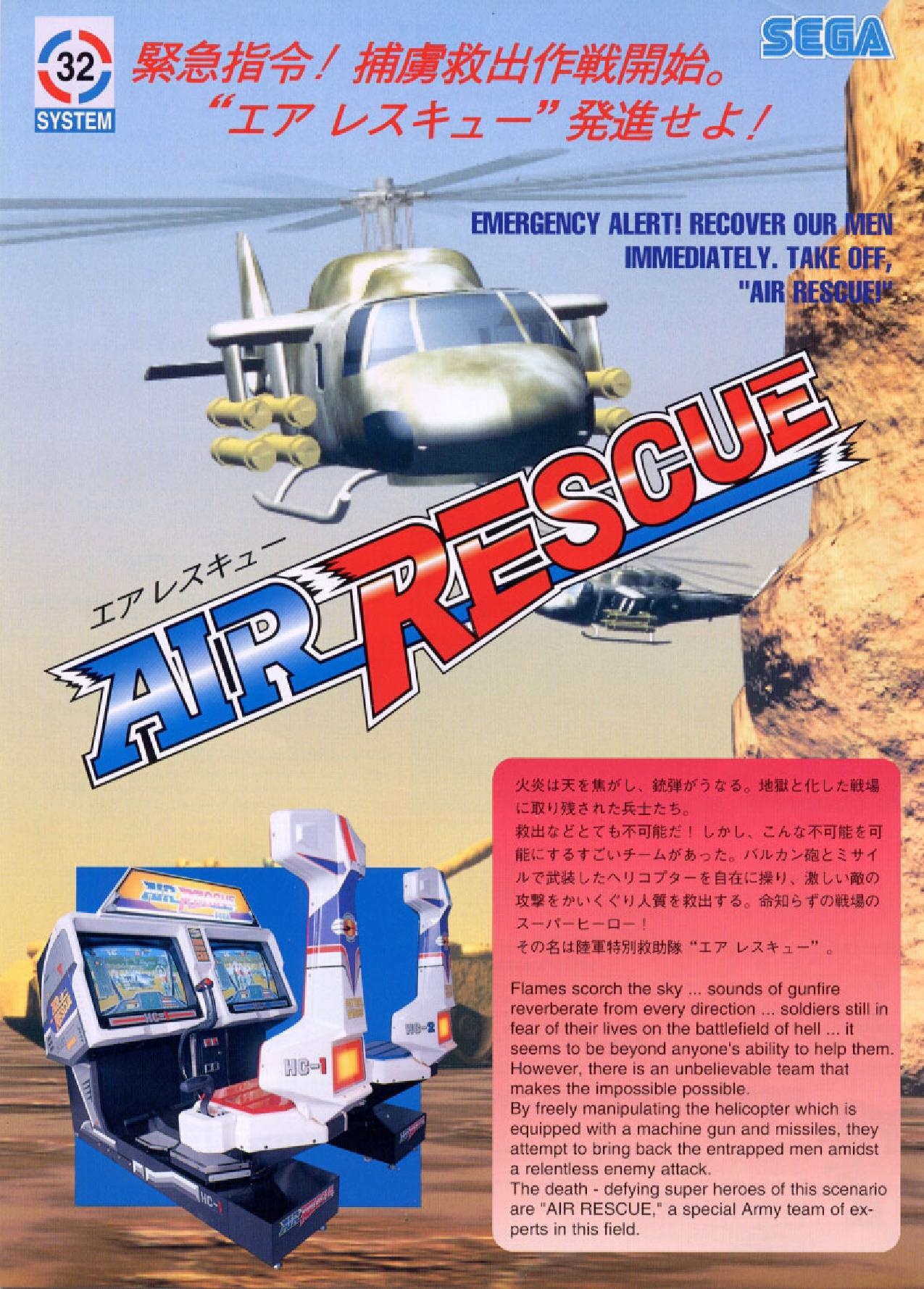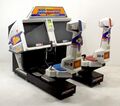Difference between revisions of "Air Rescue"
From Sega Retro
(mentioned Rikiya Nakagawa in the intro) |
|||
| Line 15: | Line 15: | ||
}} | }} | ||
}} | }} | ||
| − | {{sub-stub}}'''''{{PAGENAME}}''''' (エアレスキュー) is an arcade game for [[Sega System 32]] hardware, released in 1992. It is essentially ''[[Choplifter]]'' played from a first person perspective. | + | {{sub-stub}}'''''{{PAGENAME}}''''' (エアレスキュー) is an arcade game for [[Sega System 32]] hardware, released in 1992. It is essentially ''[[Choplifter]]'' played from a first person perspective, and had the same main programmer as ''Choplifter'', [[Rikiya Nakagawa]]{{fileref|Sega Arcade History JP EnterBrain Book.pdf|page=30}}. |
''Air Rescue'' was distributed as a two-player twin cabinet, however unlike its peers in this regard, it does not run on System Multi 32 hardware. Instead, the game is literally two System 32 boards stacked on top of each other, each driving a separate screen. | ''Air Rescue'' was distributed as a two-player twin cabinet, however unlike its peers in this regard, it does not run on System Multi 32 hardware. Instead, the game is literally two System 32 boards stacked on top of each other, each driving a separate screen. | ||
Revision as of 07:27, 14 December 2023
- For the Sega Master System game, see Air Rescue (Master System).
| Air Rescue | |||||||||||||||||
|---|---|---|---|---|---|---|---|---|---|---|---|---|---|---|---|---|---|
| System(s): Sega System 32 | |||||||||||||||||
| Publisher: Sega | |||||||||||||||||
| Developer: Sega AM1[1] | |||||||||||||||||
| Genre: Action | |||||||||||||||||
| Number of players: 1 | |||||||||||||||||
|
This teeny-tiny article needs some work. You can help us by expanding it.
Air Rescue (エアレスキュー) is an arcade game for Sega System 32 hardware, released in 1992. It is essentially Choplifter played from a first person perspective, and had the same main programmer as Choplifter, Rikiya Nakagawa[3].
Air Rescue was distributed as a two-player twin cabinet, however unlike its peers in this regard, it does not run on System Multi 32 hardware. Instead, the game is literally two System 32 boards stacked on top of each other, each driving a separate screen.
Contents
Production credits
- Staff: D&K, MIY, OTU, HID, TFF, TAK, KWO, ABC, DEF, GHI
Several of these initials (D&K, MIY and the alphabetical ABC, DEF and GHI) also appear in the high score table for Line of Fire[5]
, which could mean the two games share some developers.
- Programmer: Rikiya Nakagawa
- Sound Effects: Hiroshi Kawaguchi
Magazine articles
- Main article: Air Rescue/Magazine articles.
Promotional material
Photo gallery
Physical scans
| Sega Retro Average | ||||||||||||||
|---|---|---|---|---|---|---|---|---|---|---|---|---|---|---|
|
| 79 | |
|---|---|
| Based on 2 reviews | |
| System 32, JP | ||||
|---|---|---|---|---|
References
- ↑ 1.0 1.1 Sega Arcade History, Enterbrain, page 124
- ↑ RePlay, "Volume XVIII, No. 4: January 1993" (US; 199x-xx-xx), page 124
- ↑ 3.0 3.1 File:Sega Arcade History JP EnterBrain Book.pdf, page 30
- ↑ https://youtu.be/z637m_WehCk?t=79
- ↑ https://www.youtube.com/watch?v=30fL1VENAc0&t=1154s (Wayback Machine: 2023-05-20 14:24)
- ↑ http://backup.segakore.fr/hitmaker/game/SOUND/SITE/member01.html (Wayback Machine: 2020-08-25 16:31)
- ↑ GamePro, "August 1992" (US; 1992-xx-xx), page 20
- ↑ Sinclair User, "June 1992" (UK; 1992-05-18), page 41
| Air Rescue | |
|---|---|
|
Main page | Comparisons | Credits | Magazine articles | |



